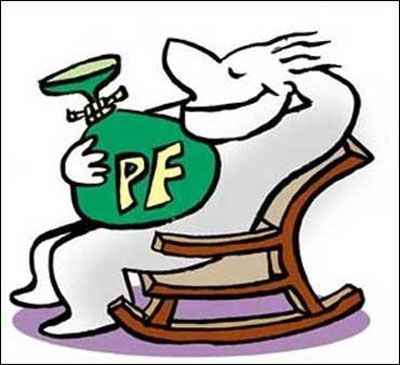Otherwise, EPFO can freeze your account. But seek detailed calculation to verify the numbers
 Employees are always advised to try and not dip into their provident fund (PF) corpus because it is the most important portion of their retirement corpus. Even if a company closes down, employees will get at least some part of their PF. Both the employee and employer contribute 12 per cent each of the basic salary towards employees’ provident fund (EPF). For 2015-16, the government has fixed the EPF rate at 8.7 per cent.
Employees are always advised to try and not dip into their provident fund (PF) corpus because it is the most important portion of their retirement corpus. Even if a company closes down, employees will get at least some part of their PF. Both the employee and employer contribute 12 per cent each of the basic salary towards employees’ provident fund (EPF). For 2015-16, the government has fixed the EPF rate at 8.7 per cent.
Most employees are used to getting money from the Employees' Provident Fund Organisation (EPFO) and no one is prepared for a letter from their earlier company asking to repay some amount to the EPFO. But a media company employee received such a letter, because an excess amount was paid to him. According to the letter, the EPFO has sought repayment otherwise it had threatened to freeze the account. He was asked to repay the excess amount by cheque to the Regional PF Commissioner. The EPFO gave a time-frame of about 20 days to refund the money.
Says K K Jalan, Central Provident Fund Commissioner: “It may have happened due to wrong calculation or if one subscriber's PF money is transferred to another subscriber's account. Sometimes, employers also credit the wrong amount. Subscribers can ask to see the calculation by registering their grievance on the EPFO's website. There is no prescribed form for this and there is no time-frame for subscribers to refund the money,” he says.
There have been such instances earlier when EPFO used to operate manually, says Malhar Majumder, a financial planner. However, these have become rare now. Excess funds get credited due to mistake in interest calculation. "If you get such a notice from EPFO, always keep proof of all the documents because you will have to declare it in your Income Tax returns as well. You have no option but to return the money. But keep a copy of the receipt,” Majumder advises.
EPFO has the power to attach subscribers' accounts, under the same rule that applies to companies when they default on their employees' PF payment. The EPFO attaching companies' accounts happens often, Jalan adds. However, according to consumer lawyer Jehangir Gai, the Act under which EPFO attaches companies' accounts does not envisage excess payment or repayment. It is applicable in case of non-payment of PF.
“But if subscribers get excess money, they have to return it. It is due to an oversight on the part of EPFO. The situation is similar to issuing stop-payment orders in case of a cheque issued. Here, EPFO has found an error and is asking for refund. But it is the EPFO's duty to intimate subscribers in advance and show how the computation has been done,” Gai points out.
Suresh Sadagopan, a certified financial planner, says subscribers must always ask for a detailed calculation of the interest paid to verify that they have received excess money.
“Send a mail to the EPFO and explain that you need to see the details of your account, how the interest has been calculated, etc. This is a case where the EPFO official has made a mistake. There is no reason why subscribers should suffer,” he says. If required, one should take legal help, says Sadagopan, though it could be a long-winding process.
Illustration: Uttam Ghosh/Rediff.com






